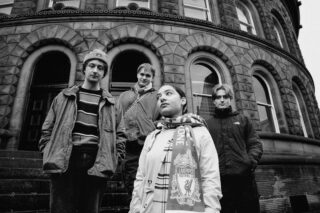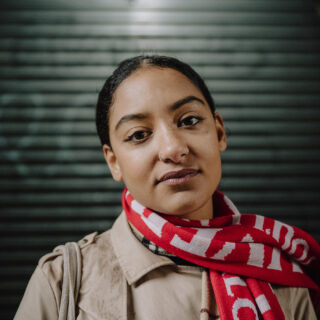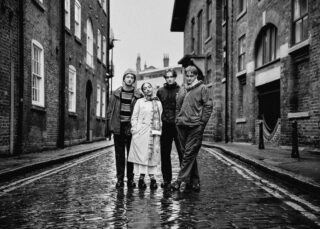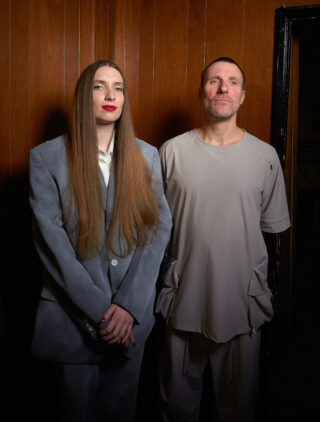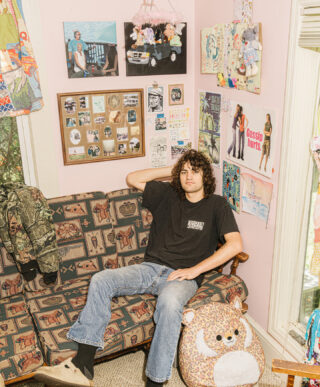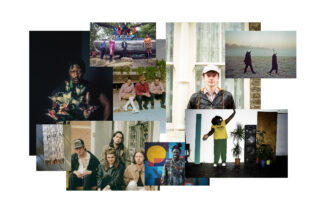Whilst there are still flickers of the English Teacher of old on the record (‘R&B’ is included, while tracks like the epic centrepiece ‘Not Everyone Gets to Go to Space’ feature the same kinds of sweeping landscape changes as defined the likes of ‘Polyawkward’), the avoidance of leaning too far into their influences and the forging of their own lane, is key to the album’s success. “Realising we were starting to sound too much like Jockstrap and then changing it up,” says Fontaine. “Nothing was off the table,” says Frost.
“And I think I’d had a bit of a concern that us having that mindset might be a problem,” adds Fontaine. “That maybe people would struggle to get into the music if it sounded different from song to song. It doesn’t fit into a particular niche, so who are we appealing to? We knew it wasn’t going to be that cohesive.”
“That still worries me a little bit with the album,” admits Eden. “When we were recording, it did feel at times like we were putting together pieces of random puzzles, and if it wasn’t quite working we’d rearrange them. But I’ve never been so proud of something. I think it’s turned out nicely.”
“I’d listen to it,” Fontaine deadpans.
Her lyrical style is the throughline that holds this eclectic bunch of songs together; consistently funny, vividly descriptive, and at once vulnerable and cutting. In the video for ‘The World’s Biggest Paving Slab’, the spectre of Sidebottom is raised again, with its central character taking in the sights of the singer’s native Colne, Lancashire and the surrounding countryside from behind a papier-mâché head – fittingly, as the song nods lyrically to Emily Brontë and the Pendle witches, both from the same corner of the world.
Sidebottom is actually a weirdly neat point of reference for Fontaine, because there are similarities between her and his creator, Chris Sievey – chiefly their shared fascination with the curious nature of everyday life. In their version of kitchen sink realism, there is a third tap marked absurdity, which is often the one from which poignancy most readily flows; Fontaine makes sense of the world with both rapier wit and, in places, violent metaphor (‘Broken Biscuits’). It marks the band out as one willing to reckon with sociopolitical issues, but Fontaine insists it’s a byproduct of writing from an honest place.
“I’m never aiming to do any one specific thing,” she says. “I’m glad people definitely seemed to pick up on the observational side of the lyrics, because I like that kind of thing myself. None of it feels intentional, though; I try to include humour because I think it’s a good way to explore different themes, but those themes just come from whatever it is I feel like I need to talk about. I’m always reacting, against something that’s happened to me, or maybe something I’ve witnessed.”
As they speak to me, the band are about to head to America for their first US shows in Brooklyn and Los Angeles, having just come off their first full UK tour – a sell-out. Anybody who caught a show would be able to attest to how far English Teacher have come as a live band; Fontaine has genuine presence about her now, and the musicianship is airtight. “Sometimes I wish I could redo our first impressions – go back and redo our first gigs, our first festivals, do them like we do it now,” says Fontaine. “But that would always be the case, wouldn’t it? We’ve definitely become better musicians.”
“I don’t want to speak for all of us,” says Eden, “but my confidence in us as a live band has grown massively, coming off this last tour. I think we’re going to be so much more comfortable expanding our live sound; the excitement levels for 2024 have really ramped up.”




